- Home
- Ninie Hammon
Trapped (Nowhere, USA Book 3) Page 9
Trapped (Nowhere, USA Book 3) Read online
Page 9
“That’s why …”
“Why nobody did anything about what’s going on here. No sense bothering you with all the other places I went, things I tried. And not just me. I’ve run into other folks, a dozen or more people who came home to nothing like I did. People who did the same thing I did – they went to the police. Simple mountain people, uneducated – I'm probably the most credible of the lot. The same thing happened to them. I’ve even met two other people who showed up here later, like you did; one was a guy looking for his grandmother. It always ends the same. It stays here, in Nower County. Whatever you saw or did inside the borders of Nower County -- it doesn’t leave with you. You forget all about it.”
“That’s impossible!”
Cotton lifted his eyebrows. “You sure about that?”
“This isn’t real. This cannot be happening.” Stuart’s mind went into full bore revolt. “Things like this don’t happen in the world. Vanishing people, vanishing belongings—”
“Vanishing memories. The constant in all of it is ‘vanishing.’ Disappearing. For some reason, there is some … force, some … there isn’t word for it. All I know is that whatever it is, it can make people vanish, memories vanish. Time vanish.”
“Time?”
“In the morning, a house looks like it was built yesterday. In the afternoon, the same house looks like it was built a hundred years ago. All those years in between, the time it would have taken for the decay to have happened, that time … vanished.”
“I think I’m losing my mind.”
“Join the club.”
Stuart suddenly thought of something. “Wait a minute. I forgot but you didn’t. You remembered it all. Why—?”
“The forever and always answer to all why questions is going to be ‘I don’t know’ so it’s really useless to keep launching them out there into conversations.”
“Ok, what—?”
“What I have observed is that it’s about being from Nower County. Being born here. You ‘outsiders’—”
“People from Away From Here—”
Cotton smiled a little. “Charlie educated you good. Yes, you flatlanders are subject to a mind sweep.”
“And nowhere people are immune?”
He nodded. “I’ve talked to Shep Clayton about it, though he’s not making much sense most of the time. His wife was supposed to show up at the neonatal unit of University Hospital in Lexington to pick him up. He’d stayed the night with their newborn son, who was scheduled to be released. But his wife never showed up. And when Shep went home … his house, it was one of the old ones. The roof was caved in, old boards holding up a shell of walls. He’d left it the day before — less than twenty-four hours — had sent his wife home to get a good night’s sleep, fix up the baby’s room — and when he came back all evidence that he or his family had ever been there was gone, blown away and decayed by time.”
“Shepherd Clayton, you say?” Stuart’s mind was spinning.
“He lost it when he saw the house. His family, they’re … simple people. They’re from waaaay back in the mountains around Poorfolk Hollow near Drayton County. Most of his people lived on the other side of the county line and when they came home, their houses were just like they’d left them. Whatever this is, it’s only happening inside Nower County. They went to the police, too, tried to report it, didn’t get anywhere. And Shep hasn’t been right in the head since.”
“Shep’s wife — her name wouldn’t be Abby, would it?”
“Yes, how do you know?”
“Because the name ‘Abby Clayton’ was written on the calendar in Charlie’s kitchen, on June fifth or sixth.”
Stuart felt himself shiver, but didn’t think he actually had, not physically anyway. “It was a reminder … for a graveside service. In Charlie’s world …” He didn’t like saying it like that, but the words fit reality. “Wherever Charlie is, Abby Clayton is dead.”
Cotton said nothing for a few moments, trying to get his own mind around it. Then he said, “We need to go pay Shep a visit.”
“To tell him I believe his wife’s dead? How’s that going to work?”
“Maybe … we won’t have to tell him anything. Maybe he already knows.”
Chapter Sixteen
“Hey, it’s me,” Hayley said when Sugar Bear answered the phone on the third ring.
“Hayley! What are you doing? I told you not to call me. What if Toby’d picked up the phone?”
“I’d have pretended it was a wrong number, or asked to speak to his mother and he’d have told me she—”
“I don’t want you talking to Toby about his mother!”
“I wouldn’t … why …? What’s wrong with you?”
She hadn’t meant to make the words an accusation but they’d come out that way and there was some small part of her that was glad she’d stood up to him.
“Wrong with me? Wrong with me?” Then he stopped, calmed down. When he spoke again, she could hear the concern in his voice. “We don’t need to be talking about what’s wrong with me. It’s what’s wrong with you that matters. Did Sam agree to … fix it?”
“Not on the phone.”
“Why can’t you just tell me—?”
“My mother might come and hear. We have to talk in person. We need to meet.”
“I don’t have anybody to look after Toby.”
“We have to talk.” There. She’d done it again, she’d been firm. “Tonight, while my parents are at that county meeting.”
“She wouldn’t do it, would she?” The question was emotionless, clinical.
“I said I can’t talk now.”
“That’s what I figured.” He let out a breath. “Okay, then. Yeah, we need to meet. We absolutely do. I’ll pick a place, and let you know.”
“What’s wrong with behind the Henderson’s barn?” The Hendersons were a retired couple who spent almost all their time with their daughter’s family in Florida. The barn on the back of their property was secluded, invisible from the road with a spot to park cars where they’d be concealed by large oleander bushes. And inside the barn was a pile of hay where you could spread out a blanket and …
He paused, seemed to be holding onto his emotions.
“When we meet … I want it to be somewhere different. I’ll call, you answer and I’ll just say where, and then you can hang up immediately, like it was a wrong number.”
Why did he want to pick some new place for them to meet? She wanted to ask, but didn’t have the chance.
“I have to go now.” And the phone went dead.
Chapter Seventeen
For the first time in his life, E.J. Stephenson had a full appreciation of the suffering of drug addicts. He got it, understood the almost irresistible yearning. Even though he had taken only a few doses of oxycontin — and had been in legitimate need of the drug — that warm, lips tingling, utopian sense of wellbeing it produced was as seductive as a beautiful woman. It was like sex in a lot of ways, in fact. It was as elemental and fundamental as that. The human need, yearning, aching desire was as powerful as the sex drive of an adolescent boy looking at a Playboy magazine.
Sam had kept him pretty “doped up,” and he was grateful for that, for the relief it provided him from the agony of his leg. But the relief was short-lived. He would usually doze off after Sam gave him one of the little white pills, and when he awoke, the ache had returned to his leg. As the drug wore off, the pain ratcheted up like dialing up the light on a dimmer switch.
He was only able to think clearly in that narrow window of time right after he woke up. The pain was a mere throbbing ache from his knee to his ankle, with spiked throbbing up into his groin. It was bearable and his mind was clear. When the drug made him so dopey, he was unable to find any meaning in his thoughts nor any desire to care. And when the pain was at its zenith, that last few minutes before his next dose of oxi, he was so distracted by the agony that thought was impossible.
He had never known pain like that. Had made it through
life mostly uninjured. He had gotten a nasty gash on his arm when he was a senior in high school. It had required thirteen stitches to close and had gotten infected later, which meant he had to go back to the doctor to re-open the wound — hurt like a firebrand — and clean it out. He’d broken a toe slamming it into the leg of the dresser when he was in college. It had turned purple and he had hobbled around for weeks, his friends making fun of the limp and his stubbed toe. And there was the horse bite that had broken a finger.
But there was nothing in E.J.’s life history that would have prepared him for how bad his leg hurt. On a scale of one to ten it was a seventy-five. It was sickening, the agony turned his stomach. Sam had wisely limited his intake to clear liquids because she knew he would not be able to keep much of anything else down.
But during that clear-thinking window — between fuzzy LaLa Land and an agony he did not know could be endured by human beings, in that window of time, he thought about the fact that he was going to die of rabies.
For a while, he had tried unsuccessfully to delude himself into the belief that the lone shot he had taken more than a decade ago would provide him the protection he needed. But he never had been very good at self-deception — not even when he was a kid and had such a crush on Charlie Ryan, McClintock, and that he sometimes imagined she had the hots for him, too.
Not.
Unless he could get the anti-rabies shot in … he wasn’t sure how much time had passed since he had been mauled, but he didn’t think it’d been twenty-four hours yet. Maybe it had, he didn’t know. But that deadline would pass soon enough with no first injection, unless the Jabberwock cooperated in a way that right now didn’t seem likely, blew back out of here like it had blown in. He didn’t believe that would happen. Had reached the same conclusion as Malachi, though they had only discussed it briefly. This wasn’t a natural phenomenon or the corruption of a natural phenomenon or the outer extreme of some naturally occurring force on earth. This was other. Outside. It could conceivably back off and leave Nowhere County alone, but E.J. didn’t believe that was the game plan. The Jabberwock wasn’t going anywhere. And neither was E.J. or anybody else.
No vaccine … rabies.
He had seen a couple of rabid animals during his medical training. A fox and a cat. It was an awful experience. The fox had had dumb rabies. The kind that Buster, unfortunately, did not have. Of the two types of rabies, dumb rabies was the most prevalent. An animal with dumb rabies was just disoriented, became unable to walk, to move at all. Eventually, their jaws locked up so they drooled, and then they had a seizure, sometimes more than one, and died.
The cat had had furious rabies, like Buster. It attacked the walls of its cage, trying to chew its way out, broke off its teeth and tore up its mouth but didn’t notice or care. Toward the end, it began attacking its own backside, chewed off its own tail and then ran around in circles trying to catch the bleeding stump that was always one step out of its grasp.
It had multiple seizures before it died.
That was coming soon to a theater near E.J.
He thought back on those last moments, with his leg a gushing gory wound he couldn’t think beyond, of diving under the power take-off and getting Buster to follow him. Then the world had grayed out. But he had caught sight of Judd’s face when Judd found him. The look of horror was imprinted on the back side of E.J.’s brain to reappear there for as long as he lived. Which apparently wouldn’t be long. The dog had been mangled by the power take-off so badly it was unrecognizable as a dog, its huge body wrapped around and around the spinning shaft, crushed, stretched out of its skin, all its bones broken. E.J. didn’t know if the horror on Judd’s face was for the dog or for him.
But the PTO had at least spared Buster the final stages of the disease, the locked jaw and seizures. In humans that stage also featured an unreasoning fear of water, hence the name hydrophobia. Crushed beyond recognition was a horrible way to die, but it had been quick.
And E.J. began to wonder if it would be possible for him to do what Buster had done. Sign out, leave the game before the curtain fell. Was there some way for him to … die without having to suffer through the horror of rabies to do it?
Would one of his friends slip him a lethal dose of oxycontin? So he could plop, plop, fizz, fizz, oh what a relief it is, and then ride off into the sunset on a pink cloud of drug-induced euphoria.
Sounded a lot better than foaming at the mouth and seizures.
Would one of them be willing to do it, to provide him an escape before the rabies took his mind, will and body and rendered him incapable of escape? If so, which one?
Sam?
Charlie?
Malachi?
Who should he ask?
Chapter Eighteen
The crowd of gawkers was gone. The funeral business that’d failed in Persimmon Ridge years ago was a growing concern now in Nowhere County. Willy Cochran and Abby Clayton on J-Day. Now Martha Whittiker. All in just two weeks.
The old lady had no family here. Somebody would have to take it upon themselves to provide a funeral and burial. Liam didn’t know who that would be, given that her only relative in the county was her grandson, who was the prime suspect in her murder.
Except he didn’t do it.
Liam certainly was no great detective, but you didn’t have to be a rocket scientist to see the scene in Dylan Shaw’s apartment had been staged.
Head wounds bled a lot. Liam knew that from his emergency medical technician training. They always looked more serious than they were. Well, unless you could see bone and gray matter, which you couldn’t with Martha Whittiker. The wound had bled, though, had to have bled. And there was almost no blood where the body had been found.
She had been killed somewhere else and her body dumped in Dylan’s apartment.
And who would do a thing like that? Liam didn’t have any idea but the only safe bet was that it wasn’t her grandson. Even a wacked-out druggie wouldn’t have killed his grandmother and then hauled her body to his own apartment and dumped it on the floor.
So if Martha Whittiker hadn’t been killed in her apartment, where had she been killed? All the evidence in the yard and flower beds had been trampled by the gawkers so there was no way to determine if she had been dragged across the yard and gardens. From a car maybe, or from the house.
Liam went to the house and searched it, looking for blood, but found none. What he did find, however, was a kitchen floor so clean you could have performed open-heart surgery on it. And the smell of bleach was almost overwhelming. Unless Martha Whittiker, in her last moments on earth had been cleaning her kitchen floor with bleach, then got up and put the cleaning supplies away—
Put them away. Liam went into the laundry room and quickly found what he was looking for — an empty bottle of bleach stuffed into the trash can. There was a red-brown smudge on the bottle, which he would bet was blood.
It might even be that a fingerprint could be lifted from the smudge. Except Liam didn’t have access to fingerprinting equipment. A forensics team might have been able to lift prints off the blood on the outside of Dylan Shaw’s apartment door, too. But there was no forensics team.
Liam walked slowly from the laundry room back into the kitchen, the likely scene of a murder, and wondered, as he had wondered countless other times in the past two weeks, what he was supposed to do with this information. Was it his job to try to track down the killer? How on earth would he go about doing that? And if he found the killer …
He shook his head, trying to order his thoughts. His mind seemed to be on a continuous loop going nowhere.
Police training had described that as a phenomenon some law enforcement officers experienced after a trauma on the job. The police officer who keeps his gun trained on the bank robber he just shot, continuing to yell at him to drop his weapon.
Liam’s mind wasn’t in that kind of loop. It was in a conundrum loop, the one he’d been in since he’d awakened in the bus shelter two weeks ago with a needle in
side his skull.
As the lone law enforcement officer in the county, what was he supposed to do … about crime and criminals? He didn’t know, hoped tonight’s meeting would provide some guidance. But throughout the day, a feeling of dread had been growing in his belly, a sense that something wasn’t right, that the meeting was likely to ping off in an entirely unexpected direction that would leave him in worse shape than he had been in before.
One thing he could do, though. He could clear Dylan Shaw of suspicion. And he knew where to start looking for the young man. Surely, he had run away from what he’d obviously discovered on his living room floor. If he had, he had become acquainted with the Jabberwock, in which case he had spent time in some state of incapacitation in the Dollar Store parking lot.
Liam would go there and have a talk with Sam or Charlie or Malachi — whoever happened to be at the clinic. Tell them what he’d found in Martha Whittiker’s kitchen. Ask them if Dylan had shown up in the Middle of Nowhere and did they know where he went afterward. He’d also ask what they thought Liam should do about the murder. They didn’t likely have any more answers than he did, but they’d at least provide moral support. Maybe even help him puzzle it out.
Dylan Shaw hadn’t killed his grandmother.
But somebody sure as Jackson had. And who might that be?
Chapter Nineteen
Viola Tackett opened the heavy curtains a crack, just wide enough so she could see out between them. They was so old and dusty she had to hold her breath or she’d have a sneezing fit.
She and the boys had come into West Liberty Middle School through a door on the north side that opened into a space beside the building you couldn’t see from the street. The auditorium and the little gymnasium inside the school still remained functional for public use. The school mirrored the architecture of the courthouse and the two buildings sat like bookends in the middle of the block, one on either side of the street, with wide steps and tall white columns and big oversized double doors, inlaid on both sides by leaded glass windows. Parking for the courthouse was out front along both sides of Main Street, each space with its own personal parking meter that hadn’t been nothing but lawn art since the Eisenhower Administration. Parking for the school was behind it, where there was a lot, a wide drop-off lane for buses and an overgrown playground where the swing set didn’t have no swings, the basketball goal didn’t have no rim and both seesaws was broke in two. The monkey bars was still there, though. Set in concrete like they was, they’d have survived an atomic bomb blast.

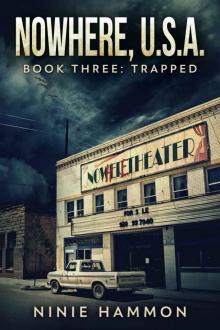 Trapped (Nowhere, USA Book 3)
Trapped (Nowhere, USA Book 3)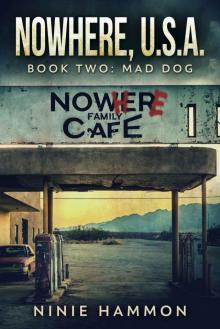 Mad Dog (Nowhere, USA Book 2)
Mad Dog (Nowhere, USA Book 2) Black Water
Black Water Nowhere USA: The Complete Series: A Psychological Thriller series (Nowhere, USA)
Nowhere USA: The Complete Series: A Psychological Thriller series (Nowhere, USA)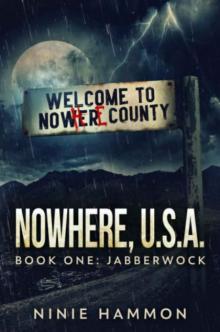 The Jabberwock
The Jabberwock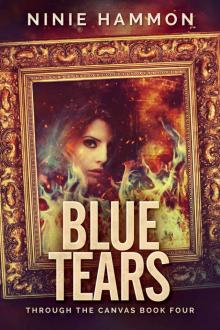 Blue Tears
Blue Tears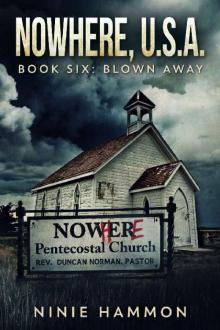 Blown Away (Nowhere, USA Book 6)
Blown Away (Nowhere, USA Book 6)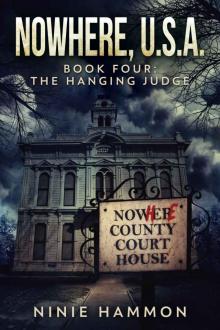 The Hanging Judge (Nowhere, USA Book 4)
The Hanging Judge (Nowhere, USA Book 4) Sudan: A Novel
Sudan: A Novel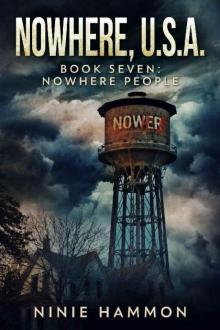 Nowhere People (Nowhere, USA Book 7)
Nowhere People (Nowhere, USA Book 7)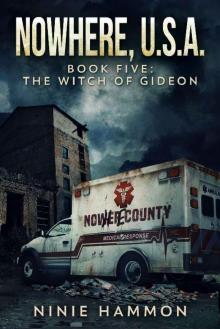 The Witch of Gideon (Nowhere, USA Book 5)
The Witch of Gideon (Nowhere, USA Book 5) Red Web
Red Web Gold Promise
Gold Promise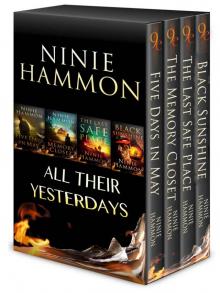 All Their Yesterdays
All Their Yesterdays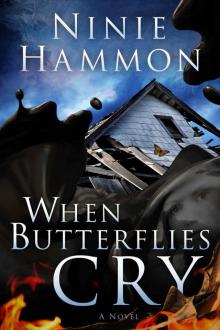 When Butterflies Cry: A Novel
When Butterflies Cry: A Novel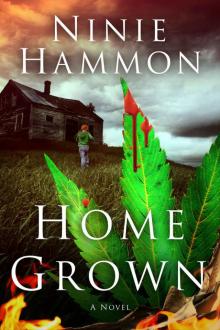 Home Grown: A Novel
Home Grown: A Novel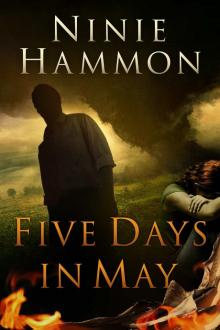 Five Days in May
Five Days in May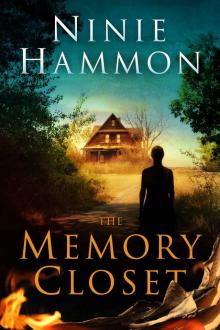 The Memory Closet
The Memory Closet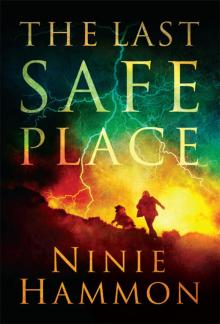 The Last Safe Place
The Last Safe Place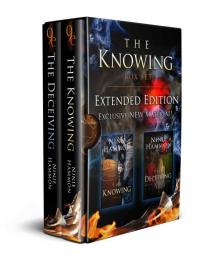 The Knowing Box Set EXTENDED EDITION: Exclusive New Material
The Knowing Box Set EXTENDED EDITION: Exclusive New Material